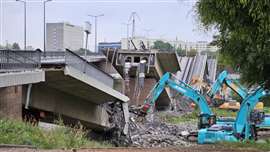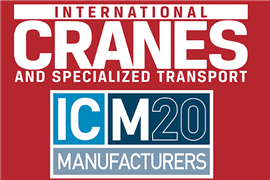Read this article in 中文 Français Deutsch Italiano Português Español
German infrastructure fund: ‘There has been no learning from Dresden bridge collapse’
16 September 2025
 Excavators demolish the collapsed Carola Bridge in Dresden, Germany, in 2024 (PHOTO: City of Dresden)
Excavators demolish the collapsed Carola Bridge in Dresden, Germany, in 2024 (PHOTO: City of Dresden)
A body representing German construction companies has warned that there has been “no learning” from the collapse of the Carola Bridge in Dresden in 2024, as a promised €500 billion infrastructure fund risks being used to plug government budget holes.
Bauindustrie, the association that represents medium- and large-sized German construction contractors has joined forces with MIRO, an association representing raw materials producers, and trade union IG Bau to call for long-term, reliable financing for public infrastructure projects. They also want to see the special infrastructure fund, approved by Germany’s government earlier this year, to be legally secured for infrastructure and climate protection projects, including at federal state level.
Peter Hübner, president of the German construction industry association HDB, also known as Bauindustrie, criticised the use of the €500 billion special fund to plug budget holes, as infrastructure in the country crumbles.
“Let me be clear: The promised additionality of the special fund is not happening. Instead, we are seeing a diversion of investment funds from the core budget to other areas,” he warned.
“The regular budget is shrinking, and the gap is being filled with the special fund. Municipal coffers remain tight and too little construction continues, even to ensure local public services. Those responsible have clearly learned nothing from the Dresden bridge collapse.”
He criticised Germany for building too slowly, with too much complexity, and with too little efficiency.
“Public clients need more flexibility in awarding contracts to accommodate the diversity of different construction projects. This is the only way to use the resources of the special fund and all public investments efficiently. With less effort, less bureaucracy, and greater cost accuracy,” he added.
Meanwhile, Christian Strunk, president of MIRO, said more needed to be done to cut red tape around the extraction of raw materials in the country, in order to make enough materials available for construction demand.
He said, “Germany needs over 500 million tons of aggregate every year – gravel, sand, chippings, and crushed stone. After drinking water, this is the country’s second-largest material flow. We can currently still fully supply ourselves. But more and more extraction operations are having to close due to a lack of extraction permits. Regional bottlenecks are already looming.”
Carsten Burckhardt, deputy federal chairman of IG BAU added, “It’s not enough to approve billions if, at the same time, there is a lack of acceptance from local industry and the necessary raw materials are not approved.
He also called for skilled workers to be paid properly and expressed his support for the federal government’s plan to introduce a federal collective bargaining agreement. “This should be done without any ifs and buts. For skilled workers recruited from abroad, the legislature must ensure that they are employed in companies bound by collective bargaining agreements,” he added.
The three bodies set out their demands to the Bundestag over the issues. They are:
- To introduce reliable, long-term financing for public infrastructure projects;
- To secure the promised additionality of the special fund for infrastructure and climate protection in the laws, including for the federal states;
- To continue to guarantee regional security of supply with construction raw materials through domestic extraction and to recognise this as part of the basic public service;
- To drastically accelerate planning and approval procedures for infrastructure projects and raw material extraction;
- To ensure that fair working conditions secured by collective agreements become more the norm again, and;
- That skilled workers recruited from abroad are employed under the applicable collective bargaining conditions.
The associations continue to call on the federal government to present a consistent infrastructure strategy that covers all aspects of the value chain, from raw material extraction, through planning and construction, to securing skilled workers.
STAY CONNECTED


Receive the information you need when you need it through our world-leading magazines, newsletters and daily briefings.
CONNECT WITH THE TEAM











